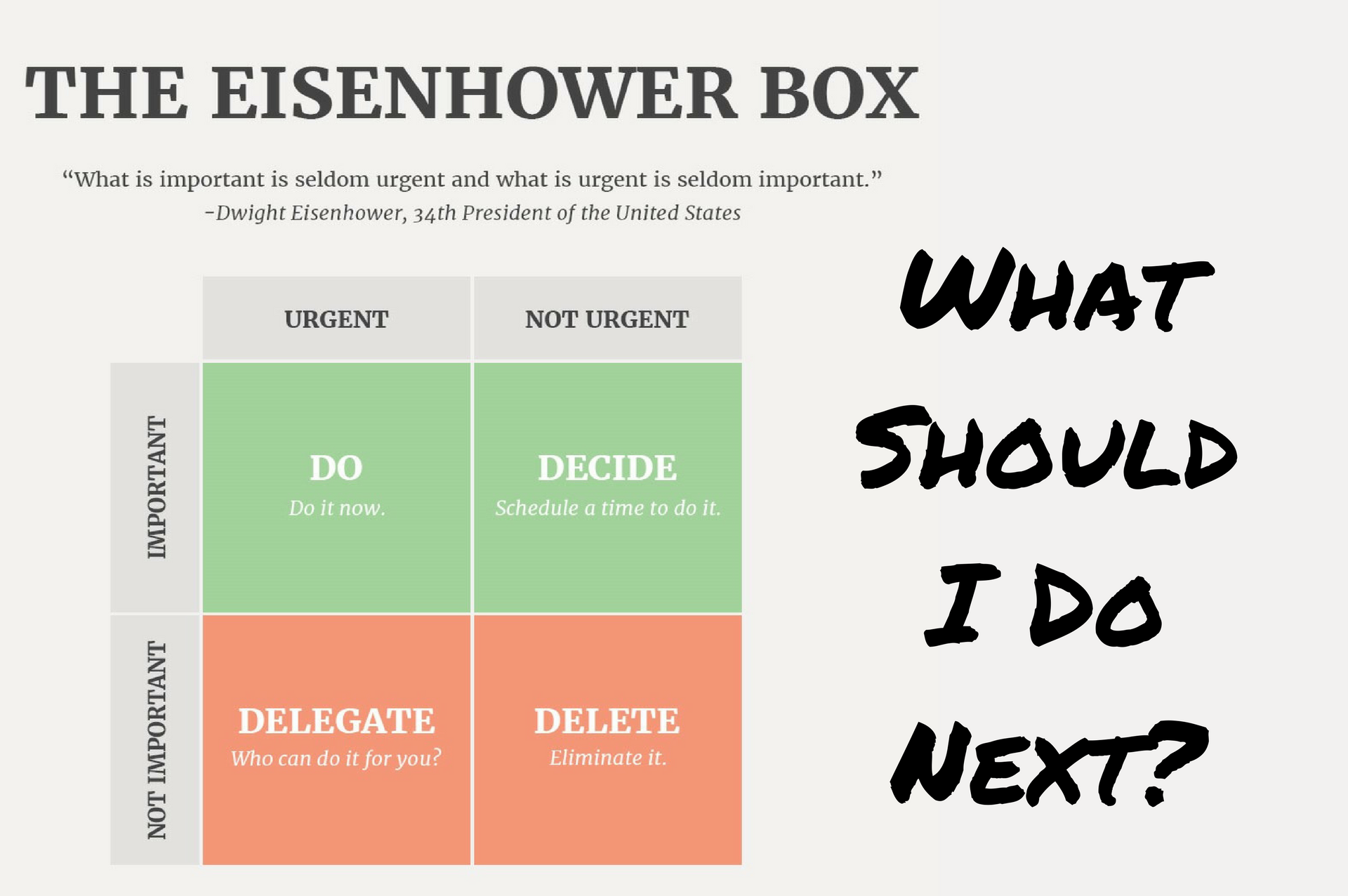Based on productivity, my favorite president is the 34th President of the United States, Dwight D. Eisenhower. He served two full terms from 1953 to 1961. During that time he launched programs that led to the creation of the internet, NASA and peaceful uses of atomic energy. He was a five-star general in the Army during World War II, the president of Columbia University and the first Supreme Commander of NATO. He got a lot done. So how did he do it?
The key was his ability to distinguish between urgency and importance. What he realized is summed up in his favorite saying about it:
“What is important is seldom urgent and what is urgent is seldom important.”
He realized the most important things to work on are those that are important and not urgent. Most people don’t spend enough time with this area of their business and life.
Do – Decide – Delegate – Delete
He developed a decision matrix called “The Eisenhower Box”. This helps your decision-making process. It shows you how to best to handle each item or task you face. It helps organize all the tasks you have to accomplish today or this week. It answers the key questions: What should I do next? Should you do it now? Should you schedule it? Delegate it? Eliminate it?
His decision box that has four sections.
The first section (DO) is for things that are urgent and important. These are tasks you usually do right away. These are typically things like a crisis, approaching deadline, critical problem, crying baby or kitchen fire. Things that must have your full attention right now. They put you in a reactive mode. Many times that does not lead to your best work. Working to long in this section leads to frustration and burn out.
The second section (DECIDE) is for things that are important but not urgent. This is the most important section. These are the things you should focus on the most. These should take up as much of your schedule as possible. In business these are your revenue producing activities: creating new products for your business, improving marketing and work flow. Things that pay high dividends and are very important but not always urgent. Planning itself falls into this important category, as does exercise, relationships, recovery time, learning, and gaining clarity. These tasks find you in a proactive and producing mode. You feel good getting things done. They move you closer to your long term goals. One of the greatest improvements in productivity and results I see, is when someone time blocks out large sections of time each week to work on the important but not urgent tasks!
The third section (DELEGATE) is for things that are not important but seem urgent. These are things that you try your best to delegate and streamline off your plate. These show up in the form of calls, interruptions, distractions, some meetings and other people’s crisis’s. Too many people spend most of their time here. They think the items they are working on are important to them but in actuality they are not. Many times they are important to someone else but not to you. If you fall into this category you will feel like you are getting things done – day after day – that you are busy but you will not be moving towards your own long term goals. Once you realize this, it’s easier to get clear on your own long term goals and politely say “no” to new “not important” requests and delegate out more things.
The fourth and final section (DELETE) is for things that are not important and not urgent. These are tasks that you eliminate all together. These are long term time wasters: watching too much TV, surfing the internet to much, falling into the Facebook trap, busy work and unimportant meetings. A little bit of these things could be good to relax or take a break but make sure they don’t take up any major time. Be aware and look for activities that really ended up being time wasters. Make a note of that, so next time you are choosing an activity and you know it’s part of section four you keep it to a minimum or eliminate it all together.
Important verses Non-Important
Now that you understand the model, the key is to begin to distinguish between what is truly important and what is not. Important tasks are things that contribute to your long-term goals and mission. The important things in your business usually revolve around revenue producing activities. Keeping your focus on the important things will pay big dividends. Once you realize something is important (not just urgent) be sure to schedule it and give it a high priority. The opposite is also true – once you realize that something is not important you need to act. You can just eliminate it. You can delegate it. However you do it, you must reduce its footprint on your time and schedule to make way for the truly important.
Get Clear – Time Block – Use the Box!
Avoid the busy trap. Many entrepreneurs are busy but it’s actually a form of laziness where you are avoiding the thinking and decision making you need the most. Tim Ferris says it well: “Being busy is not the same as being productive. In fact, being busy is a form of laziness – lazy thinking and indiscriminate action.” Get clear on your long-term goals. Then you know when something is important or not important. Schedule in time for the important items in your life – use time blocking. Keep looking back at your day and your week to see where you spent your time – are you stuck in section one or three? Use the Eisenhower Box on a daily and weekly basis to help you be more productive. That way you know if you should do it, decide and schedule it, delegate it or delete it. As you make more and more decisions on urgency and importance you develop a skill that, like General Eisenhower, will serve you well for the rest of your life!
All the best – until next time wytayba,
Blaine
 Blaine Oelkers is a lifetime entrepreneur, a graduate of Purdue University and Stanford University’s Entrepreneurship program. He’s achieved over 100 Million dollars in sales and coached 1000’s of people. He’s currently the Chief Results Officer for many organizations as well as the President/Founder of a company called Selfluence. He helps business owners and their organizations achieve essentials results using the unique concept of a “Super Results Day”. He can be reached at blaine@selfluence.com.
Blaine Oelkers is a lifetime entrepreneur, a graduate of Purdue University and Stanford University’s Entrepreneurship program. He’s achieved over 100 Million dollars in sales and coached 1000’s of people. He’s currently the Chief Results Officer for many organizations as well as the President/Founder of a company called Selfluence. He helps business owners and their organizations achieve essentials results using the unique concept of a “Super Results Day”. He can be reached at blaine@selfluence.com.
Blaine is America’s Chief Results Officer® and the world’s greatest creator of doneness. He knows your results matter and he can help you get better, faster and more long-lasting results. Get started with one simple and elegant results technique that activates your mind with your top goal over 100 times a day. He explains it in a short TEDx talk he did which has been viewed by over 120,000 people! Your results matter – get access immediately at www.BlaineTEDx.com

